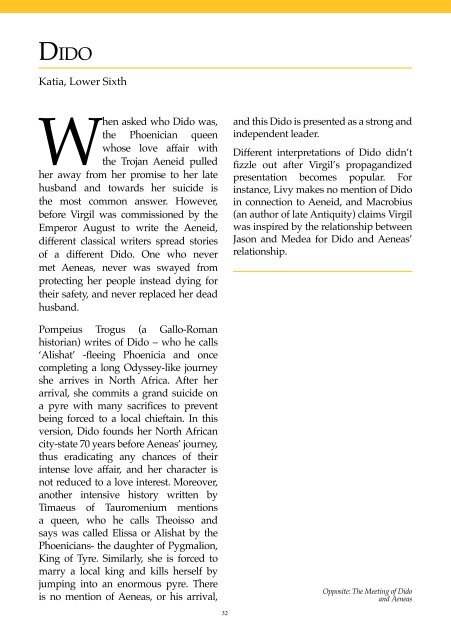You also want an ePaper? Increase the reach of your titles
YUMPU automatically turns print PDFs into web optimized ePapers that Google loves.
Dido<br />
Katia, Lower Sixth<br />
When asked who Dido was,<br />
the Phoenician queen<br />
whose love affair with<br />
the Trojan Aeneid pulled<br />
her away from her promise to her late<br />
husband and towards her suicide is<br />
the most common answer. However,<br />
before Virgil was commissioned by the<br />
Emperor August to write the Aeneid,<br />
different classical writers spread stories<br />
of a different Dido. One who never<br />
met Aeneas, never was swayed from<br />
protecting her people instead dying for<br />
their safety, and never replaced her dead<br />
husband.<br />
Pompeius Trogus (a Gallo-Roman<br />
historian) writes of Dido – who he calls<br />
‘Alishat’ -fleeing Phoenicia and once<br />
completing a long Odyssey-like journey<br />
she arrives in North Africa. After her<br />
arrival, she commits a grand suicide on<br />
a pyre with many sacrifices to prevent<br />
being forced to a local chieftain. In this<br />
version, Dido founds her North African<br />
city-state 70 years before Aeneas’ journey,<br />
thus eradicating any chances of their<br />
intense love affair, and her character is<br />
not reduced to a love interest. Moreover,<br />
another intensive history written by<br />
Timaeus of Tauromenium mentions<br />
a queen, who he calls Theoisso and<br />
says was called Elissa or Alishat by the<br />
Phoenicians- the daughter of Pygmalion,<br />
King of Tyre. Similarly, she is forced to<br />
marry a local king and kills herself by<br />
jumping into an enormous pyre. There<br />
is no mention of Aeneas, or his arrival,<br />
and this Dido is presented as a strong and<br />
independent leader.<br />
Different interpretations of Dido didn’t<br />
fizzle out after Virgil’s propagandized<br />
presentation becomes popular. For<br />
instance, Livy makes no mention of Dido<br />
in connection to Aeneid, and Macrobius<br />
(an author of late Antiquity) claims Virgil<br />
was inspired by the relationship between<br />
Jason and Medea for Dido and Aeneas’<br />
relationship.<br />
Opposite: The Meeting of Dido<br />
and Aeneas<br />
32


















